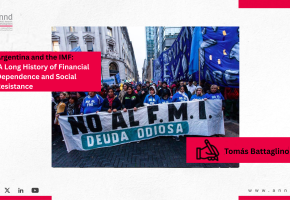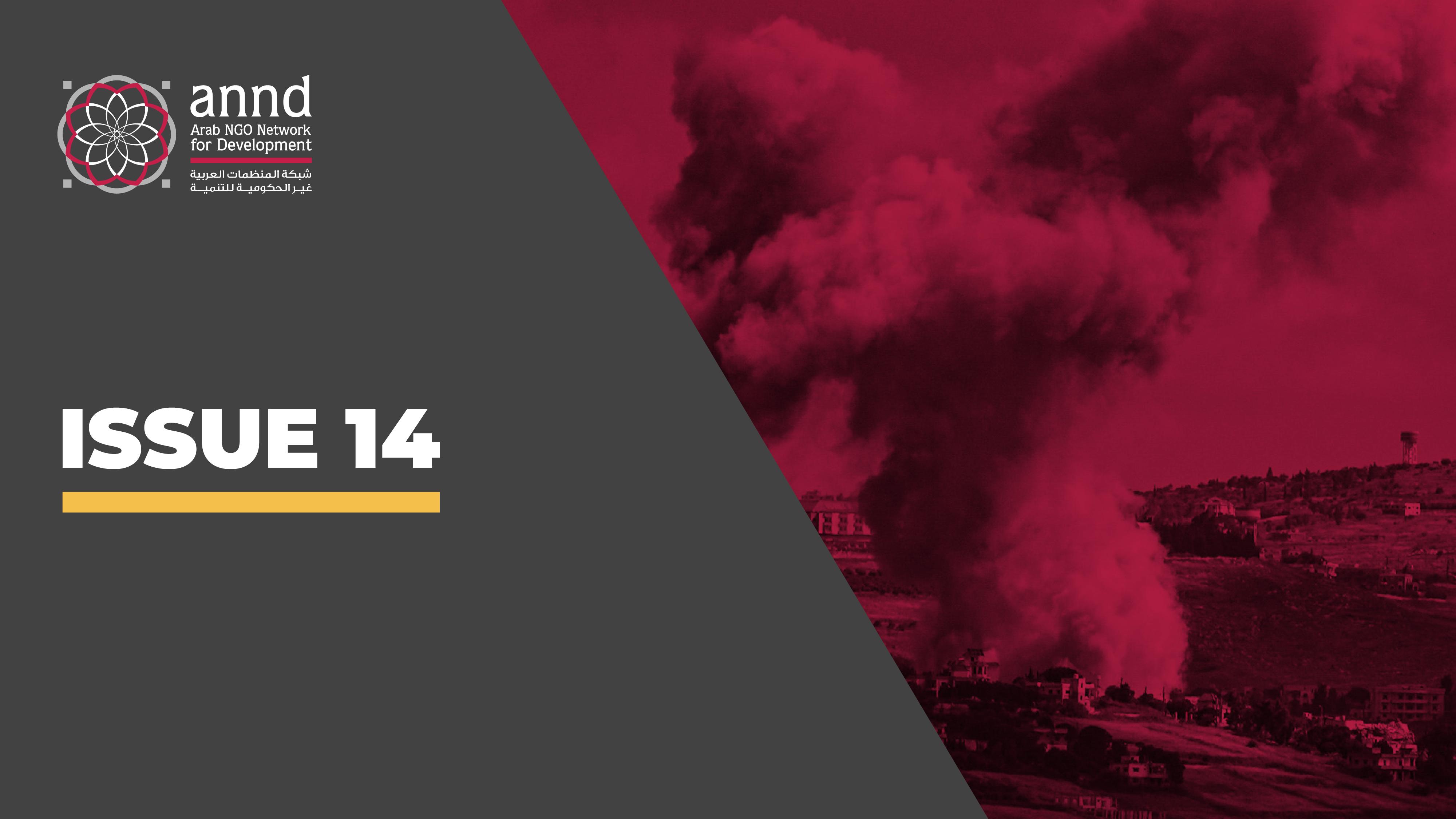
A Region on Fire
Issue 14 - October 10, 2024
Targeting Beirut, UNIFIL, and Ongoing Massacres in Gaza
In the past hours, the Israeli army has imposed a severe siege on the northern Gaza Strip, on the 370th day of the war. The area has been completely isolated, cutting off humanitarian aid.
For the third time, Israel has targeted the capital, Beirut, along with southern villages, towns, and the Bekaa region, as well as southern suburbs. During the day, the Israeli army also attacked three UN forces locations, including a guard tower.
The direct attack on the UN peacekeeping forces (UNIFIL) reflects Israel’s blatant disregard for the international organization and its resolutions. Israel has previously disrespected the UN, with its ambassador tearing up the UN charter after Palestine’s membership was approved, and the Israeli Prime Minister even demanded the dismissal of the UN Secretary-General for merely stating that Israel’s actions were unacceptable and calling for a ceasefire. Israel consistently refuses to adhere to the resolutions of the Security Council, the General Assembly, the International Court of Justice, and the International Criminal Court. Military experts suggest that Israel's attacks on UNIFIL forces in southern Lebanon could be a precursor to a ground invasion, potentially using crossings supervised by UNIFIL.
Palestine
On the 370th day of aggression on the Gaza Strip, the Israeli army continued artillery bombardments and airstrikes across various areas, including Nuseirat Camp, Jabalia, and Khan Yunis, with the death toll reaching 72 in the last 24 hours.
Gaza’s civil defense confirmed that the Israeli occupation has enforced a complete blockade on northern Gaza, severing it from the rest of the region. Meanwhile, the Al-Qassam Brigades claimed responsibility for setting a sophisticated ambush that left several Israeli soldiers dead or injured.
In the West Bank, Israeli forces escalated their operations in several areas, leading to clashes following a raid on Al-Far'a refugee camp south of Tubas, just hours after four Palestinians were killed in Nablus.
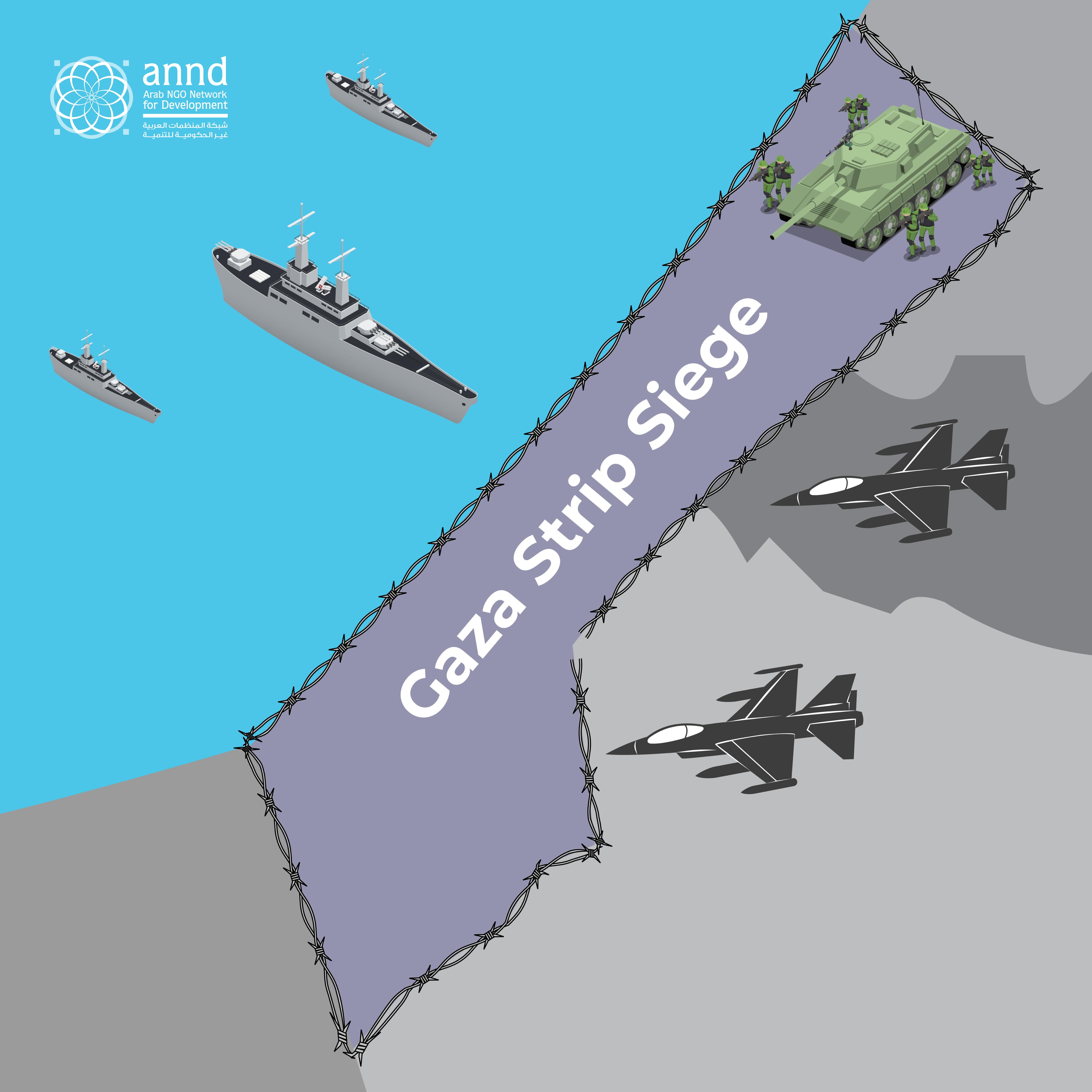
Lebanese Battlefield Developments
On the 14th day of Israeli airstrikes, Israeli fighter jets launched a series of raids on southern Lebanon, the Bekaa Valley, and Beirut’s southern suburbs. Israeli forces also bombed areas near the Masnaa border crossing. The Israeli army reported destroying over 500 Hezbollah facilities in southern Lebanon.
Yesterday, Israeli warplanes launched several strikes on the Karak area in the Zahle district near the Husayniyah, causing widespread destruction and many casualties. The raid resulted in nine martyrs and around 30 wounded, including women and children.
In the evening, Israel targeted Nweiri, a densely populated civilian area in the heart of Beirut, with two airstrikes. Israeli media reported the target as Hezbollah’s coordination and liaison official, Wafiq Safa. The building hit was in a civilian area, resulting in 22 martyrs and over 120 wounded, some in critical condition.
In a significant escalation, UNIFIL’s headquarters in Naqoura and nearby sites were repeatedly bombed. A press statement confirmed that two UN peacekeepers were injured after an Israeli Merkava tank fired directly at a watchtower in Naqoura, hitting it and causing the injuries. Additionally, Israeli forces opened fire on another UN site in Al-Labouneh, damaging vehicles and the communications system. Israeli drones were also seen flying over the UN compound.
On Wednesday, Israeli forces deliberately fired at surveillance cameras around the site, disabling them. They also intentionally targeted a UN observation post in Ras Naqoura, damaging its lighting and relay station.
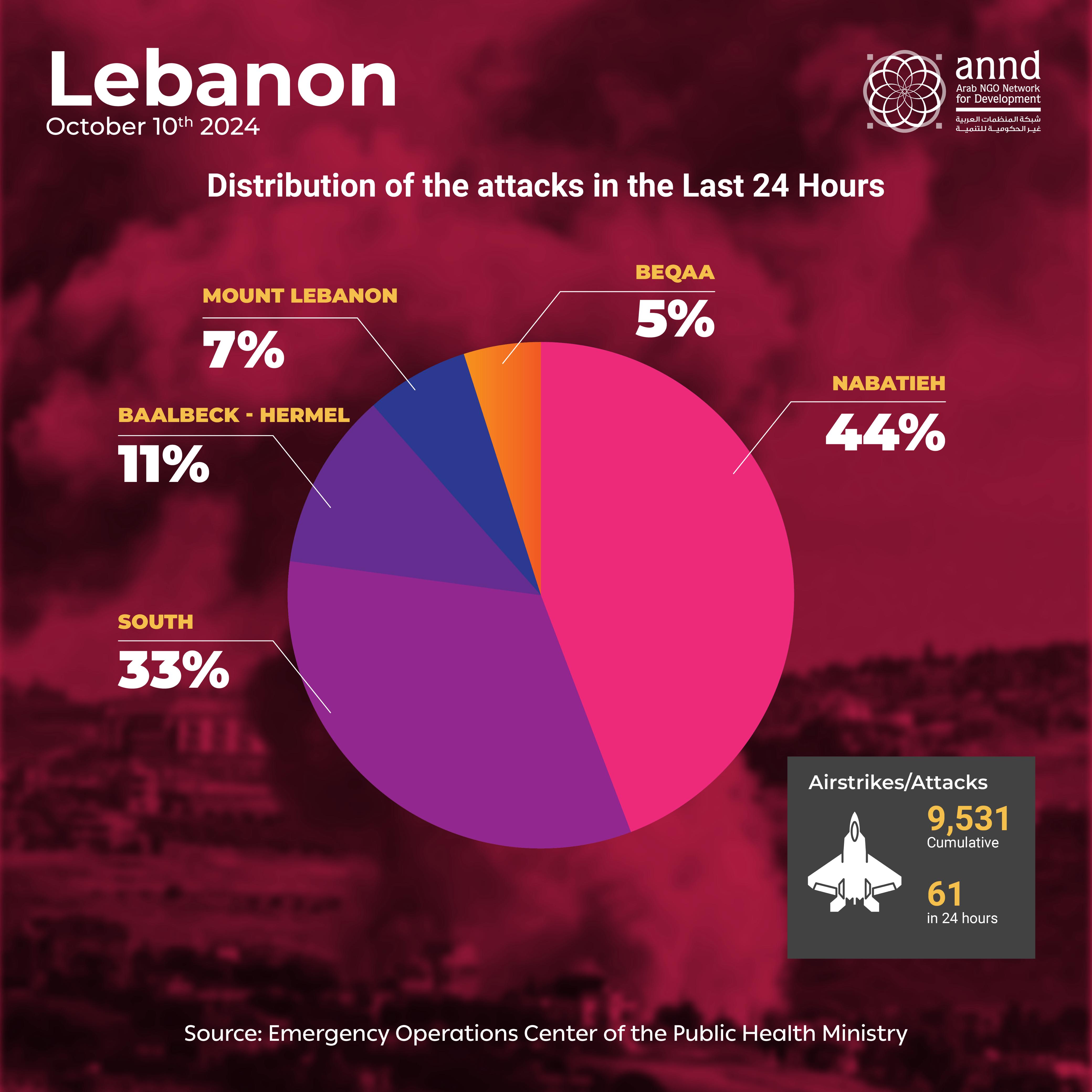
Political Positions
Prime Minister Najib Mikati stated that diplomatic contacts have intensified ahead of the Security Council session, aiming to secure a ceasefire. He reaffirmed Lebanon's commitment to implementing Resolution 1701, on condition that "Israel" adheres to it, and stressed the priority of stopping the "Israeli" aggression.
The White House reiterated that Israel has the right to defend itself and characterized its actions as a specific operation.
Humanitarian Response
Lebanon’s Interior Minister Bassam Mawlawi emphasized the need for additional shelters in Beirut for displaced people while affirming that any violation on private or public property is unacceptable. He assured that security forces are fully deployed across Beirut and that most Syrian refugees in Lebanon can return to their country.
Telecommunications Minister Johnny Corm announced that the ministry had dispatched experts to the south to repair the network in besieged areas such as Rmeish and Nabatiyeh. He added that the ministry is cooperating with local municipalities to provide diesel fuel for stations, ensuring 90% network functionality across Lebanon. However, the damage to the network exceeds that recorded during the 2006 conflict but remains under control.
The UN Office for the Coordination of Humanitarian Affairs reported that a quarter of Lebanon's territory has received evacuation orders from Israel. UNICEF reported that around 350,000 children have been displaced due to the ongoing conflict, with 61 airstrikes recorded in the last 24 hours, bringing the total number of attacks since the beginning of the conflict to 9,531.
The death toll over the last 24 hours stands at 28 martyrs and 113 injured (excluding those from the Beirut evening airstrikes), bringing the total number of martyrs to 2,169 and the injured to 10,212 since the start of the events.
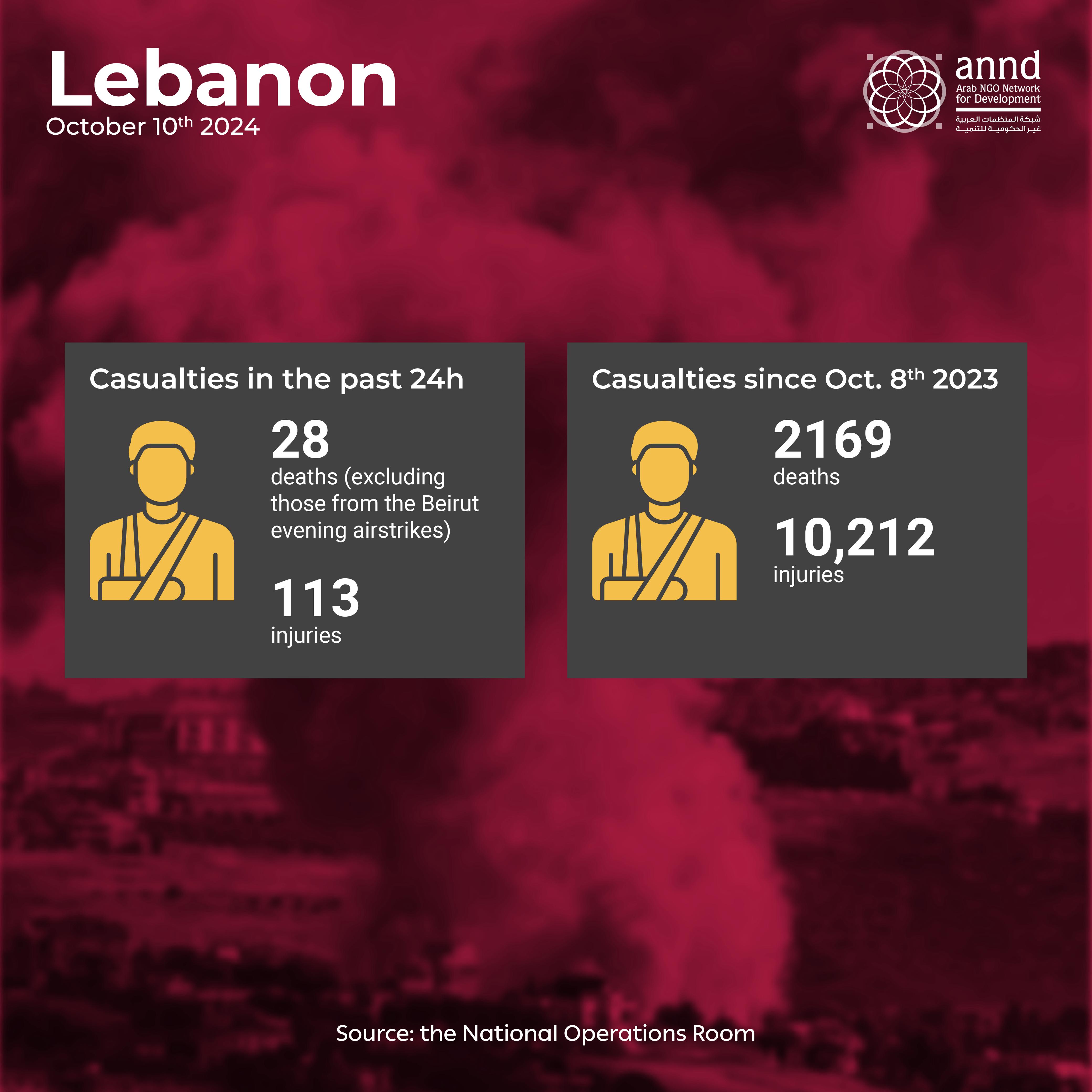
To date, 1,023 shelters have been opened, with 822 of them reaching maximum capacity. A total of 186,400 displaced people (38,700 families) have been registered in shelters according to the lists issued by the National Operations Room.
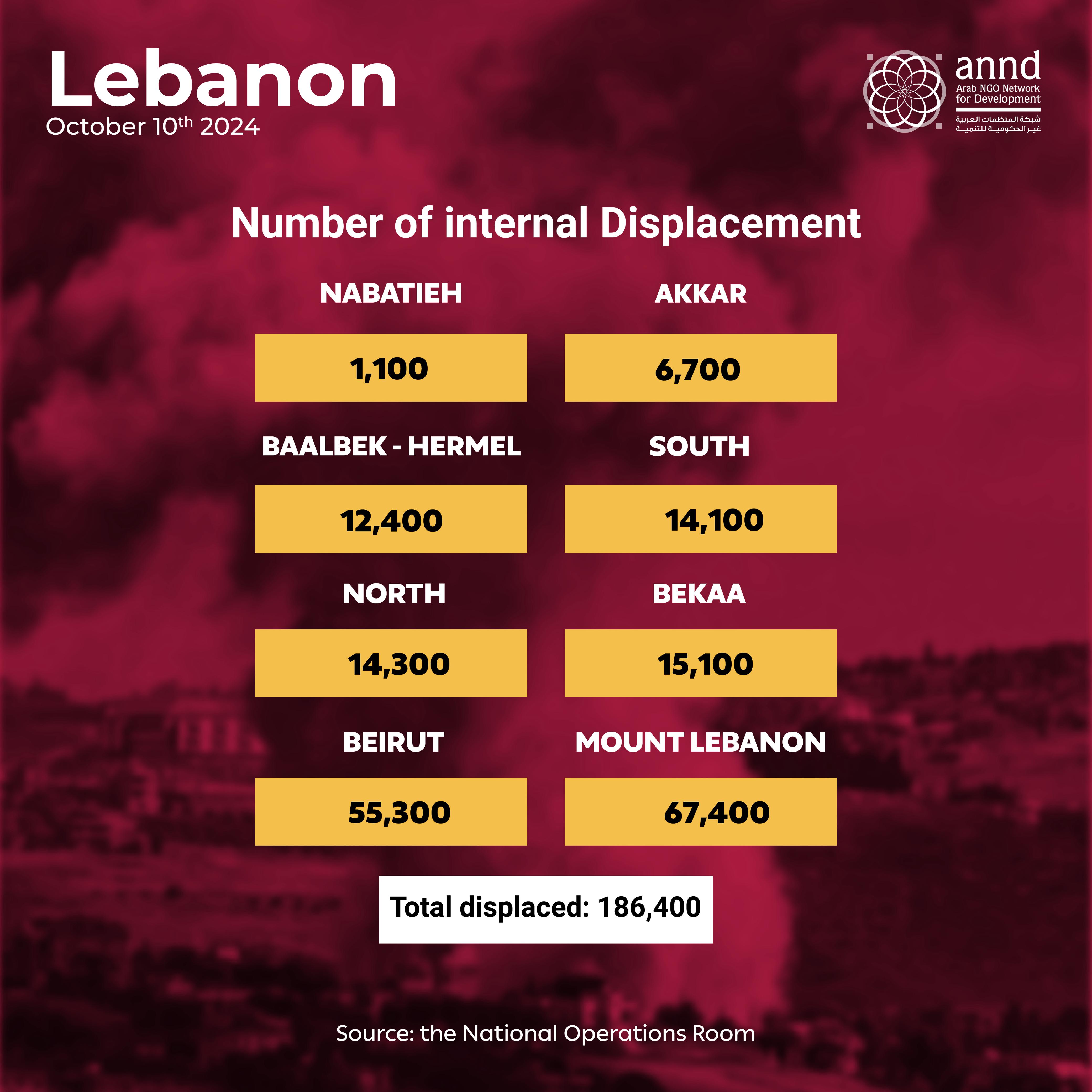
From September 23 to October 10, 2024, the General Security has recorded the crossing of 314,481 Syrians and 111,801 Lebanese citizens into Syrian territory.
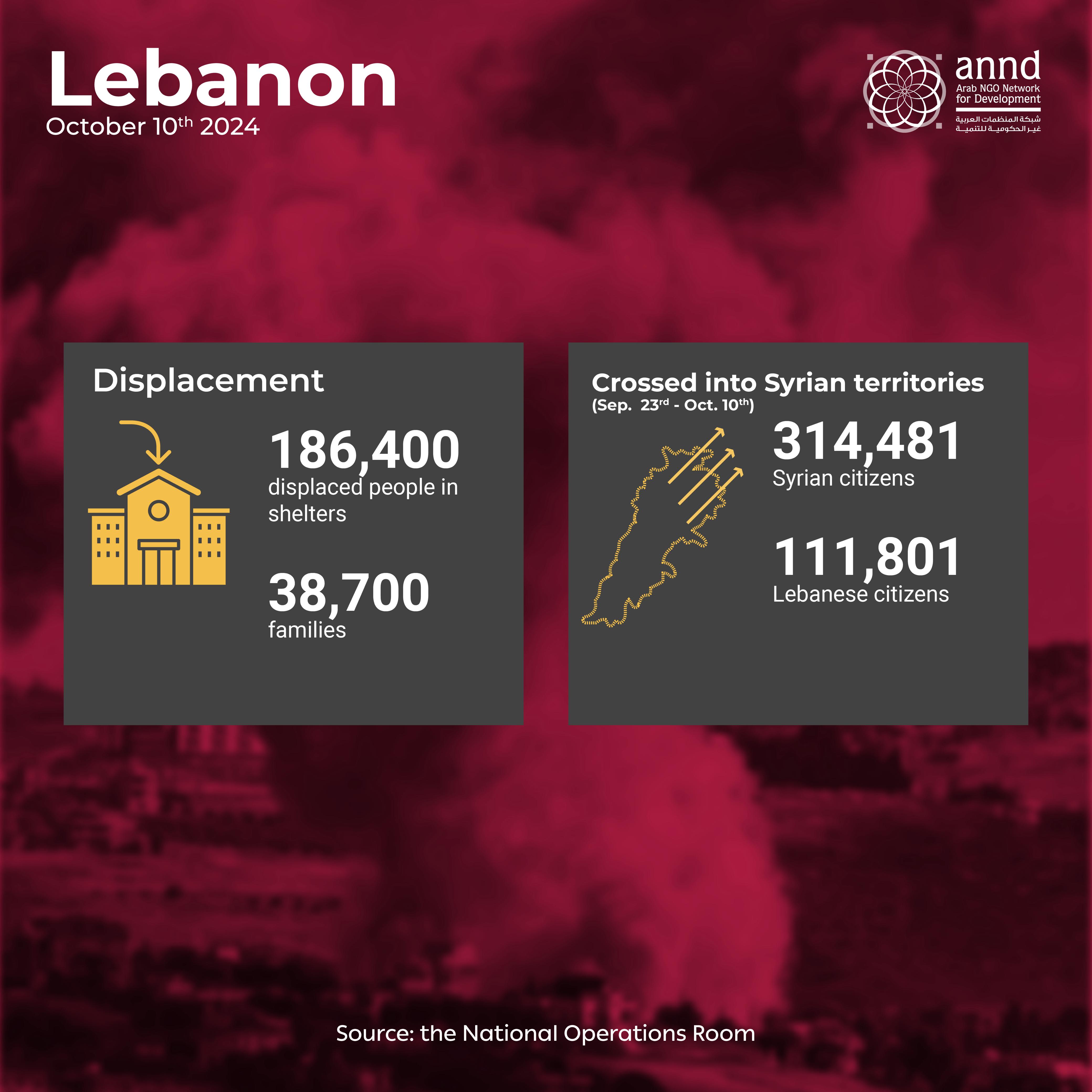
The European Union has launched a humanitarian airlift operation consisting of three flights, with the first flight scheduled to arrive in Beirut on October 11, delivering supplies for shelters from the EU.
Canada’s Ministry of International Development announced an additional CAD 15 million in funding to meet the urgent humanitarian needs of civilians in Lebanon.
The French Foreign Ministry announced that an international conference dedicated to Lebanon will be held in Paris on October 24 with the aim of mobilizing the international community to support the Lebanese and their institutions.
The president of the Lebanese Private Hospitals Syndicate, Sleiman Haroun, warned that Lebanon’s resources are limited and that the healthcare sector cannot bear the burden of war. He added that the medical supplies reaching Lebanon are insufficient, especially for critical surgical needs.
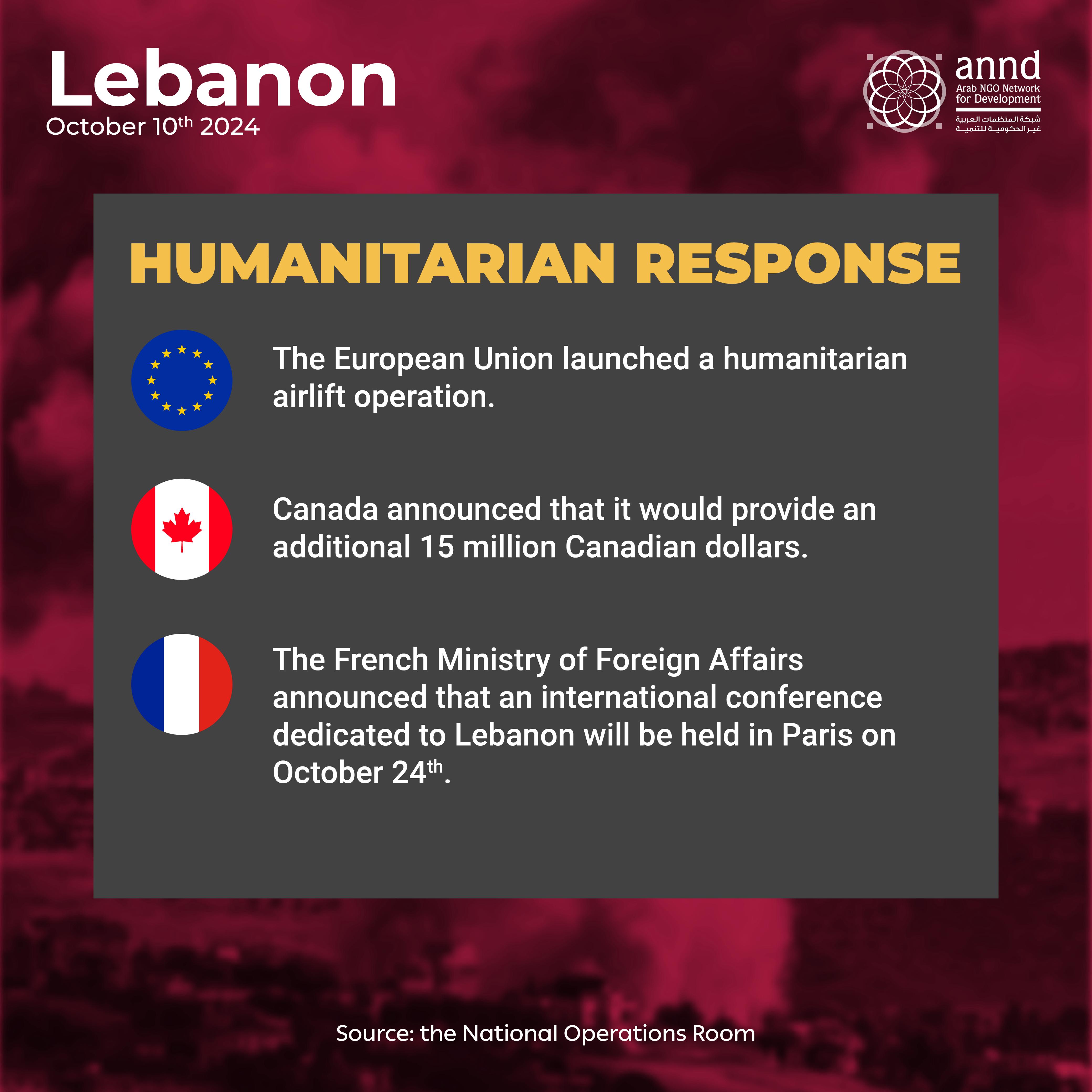
International Positions
The Chief of the General Staff of the Israel Defense Forces, Herzi Halevi, vowed to continue striking Hezbollah with full force, stating that Israel will not allow the group to recover or regain strength.
Iran’s Foreign Minister, in an interview with Al-Jazeera, stressed the need for a ceasefire in Gaza and Lebanon, affirming that it is necessary for both fronts.
The Kuwaiti newspaper "Al-Anbaa" quoted a diplomatic source as saying that Western countries gave Israel a three-week deadline to implement what it seeks in Lebanon.
Israel’s Ambassador to the UN stated that Israel has no desire to remain in Lebanon but will do whatever is necessary to push Hezbollah away from its northern borders. He also recommended relocating UNIFIL forces five kilometers northward, adding that Israel remains focused on fighting Hezbollah while continuing its dialogue and coordination with UNIFIL.
Germany's Chancellor announced the imminent dispatch of more weapons to Israel.
Bloomberg reported that Washington has proposed additional economic sanctions on Tehran as an alternative to directly targeting Iranian economic infrastructure.
The Russian Embassy in Tehran advised its citizens to follow security protocols in light of a possible Israeli strike on Iranian facilities.
The Pentagon noted that Israeli ground operations in Lebanon remain limited.
Deputy US Ambassador to the UN tells Security Council that the solution to the crisis is for Lebanon to be strong and enjoy real sovereignty protected by a legitimate security force represented by the Lebanese Armed Forces
After the Israeli army attacked UN peacekeeping forces in southern Lebanon, an Israeli army spokesperson claimed that UNIFIL had been warned before the firing. The following responses were issued:
- Italy’s Ministry of Foreign Affairs summoned the Israeli ambassador in Rome, informing him that Israel’s actions constitute "potential war crimes" after the attack on UNIFIL in Lebanon.
- The White House National Security Council spokesman said the United States is deeply concerned by reports that Israel fired on UN peacekeeping positions in Lebanon and is pressing Israel for details.
- Spain’s government condemned Israel’s firing on UNIFIL forces.
- Ireland’s Prime Minister expressed deep concern over Israel’s firing on international peacekeepers in southern Lebanon, saying such actions cannot be tolerated.
- The UK also voiced concern over the targeting of UNIFIL.
Recent publications
